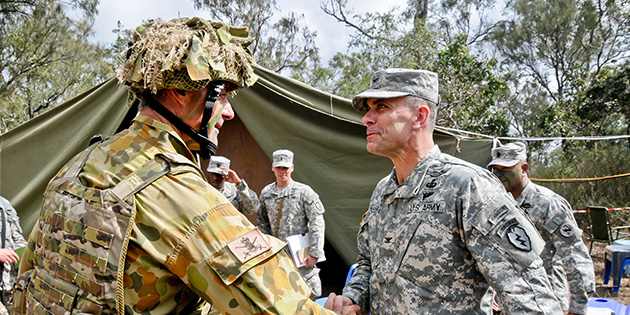
David Lange sparked an international crisis in 1985 when, in pursuit of a purist anti-nuclear agenda, his government effectively barred US warships from New Zealand. The US responded by suspending its ANZUS treaty obligations to New Zealand. In the years since, undeterred, New Zealand has continued on its pacifist path, downgrading its airforce, for instance, although military spending overall has slowly recovered from the lows of the early 2000s.
Lest Whaleoil readers think this article is going to be another round of Kiwi-bashing from a smug Aussie, it must be pointed out that Australia is doing little better. If not worse. Quote:
Once again we have embarked on a federal budget and an election campaign without the single most important issue ? the defence of Australia ? playing the slightest role. Speaking technically, that?s completely nuts. End of quote.
New Zealand?s defence budget is about 1% of GDP. Australia is managing scarcely 2%. Earlier this year, US president Trump lambasted America?s NATO allies for failing to keep to their treaty commitment of minimum defence spending. America?s allies, he said, were hiding behind America?s skirts; relying on the US? massive expenditure of blood and treasure to keep them safe.
Australia and New Zealand are not much better. We rely on not just our American allies, but also on our geographical remoteness to save us from spending enough to adequately defend ourselves. But in the 21st century, neither can be relied on as they once might have been. Quote:
Every element in our strategic circumstances is getting worse, yet we are doing effectively nothing to produce a defence force that might deter our enemies, bolster our friends and defend our nation.
How can this be, with $50 billion for 12 new submarines, $38bn for nine new frigates and $17bn for 72 Joint Strike Fighters?
All of these programs are going to take so long to deliver that we will have passed through the strategic challenge of our time before they arrive?we identified an urgent national priority in 2009 and [will take] about 50 years to address it ? 10 years longer than the time from the start of World War I to the end of World War II.
That is not a sign of a nation that takes its own security remotely seriously. End of quote.
The major problem facing Australia ? as it is most of the West ? is that citizens have become over-used to holding their hands out and expecting ?the gummint? to fix every little problem. The catastrophic failure of Finland?s Universal Basic Income experiment is merely the pointiest end of the cradle-to-grave welfare expectations that have cosseted generations in the West. Quote:
On budget night my email inbox, like that of all journalists, pinged relentlessly like a sonar in a nest of enemy ships, with endless emails demanding more social spending. Left-handed hockey trainers beyond the Blue Mountains ? neglected in the budget! Inner-city Esperanto therapy ? shamelessly ignored!
Most of the causes were worthy but, while we are very wealthy, we are paying ourselves more than we can afford and promising ourselves more than we can deliver, and neglecting basic defence. Our defence strategy is still simply to rely on the Americans. End of quote.
As Chris Masters? Uncommon Soldier relates, Australia?s soldiers acquitted themselves admirably in places like Afghanistan. So much so that America?s military began to study Australia?s training techniques. But the fact remains that: Quote:
Our boutique forces are not designed to generate war-fighting capability or any independent strategic effect.
They are designed to slide into the US order of battle in the hope that in return the Americans will always look after us. End of quote.
theaustralian
Donald Horne, author of The Lucky Country, once described Australia?s position in the global order as that of a vassal state. Horne intended as a positive: Australia is a middle power, but far too small to adequately defend itself from great powers. So Australia has adopted a strategy akin to old-style vassalage: swearing allegiance and service to a stronger ally in return for being drawn under their protective umbrella.
That?s a sensible strategy. The problem is that Australia (and New Zealand) is rapidly slipping from a vassal state to a mendicant. Sooner or later, that stronger ally is going to cut us loose unless we mend our ways.

